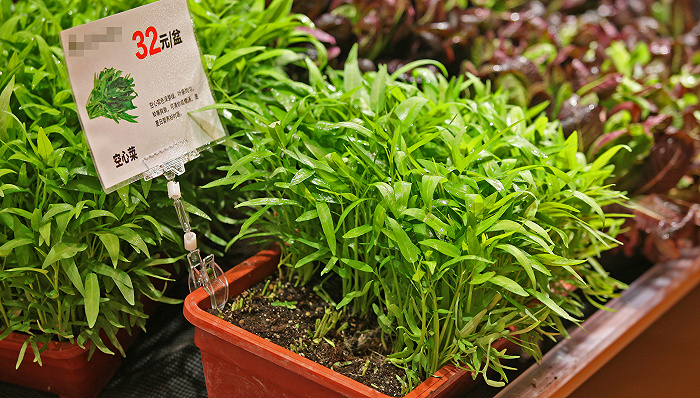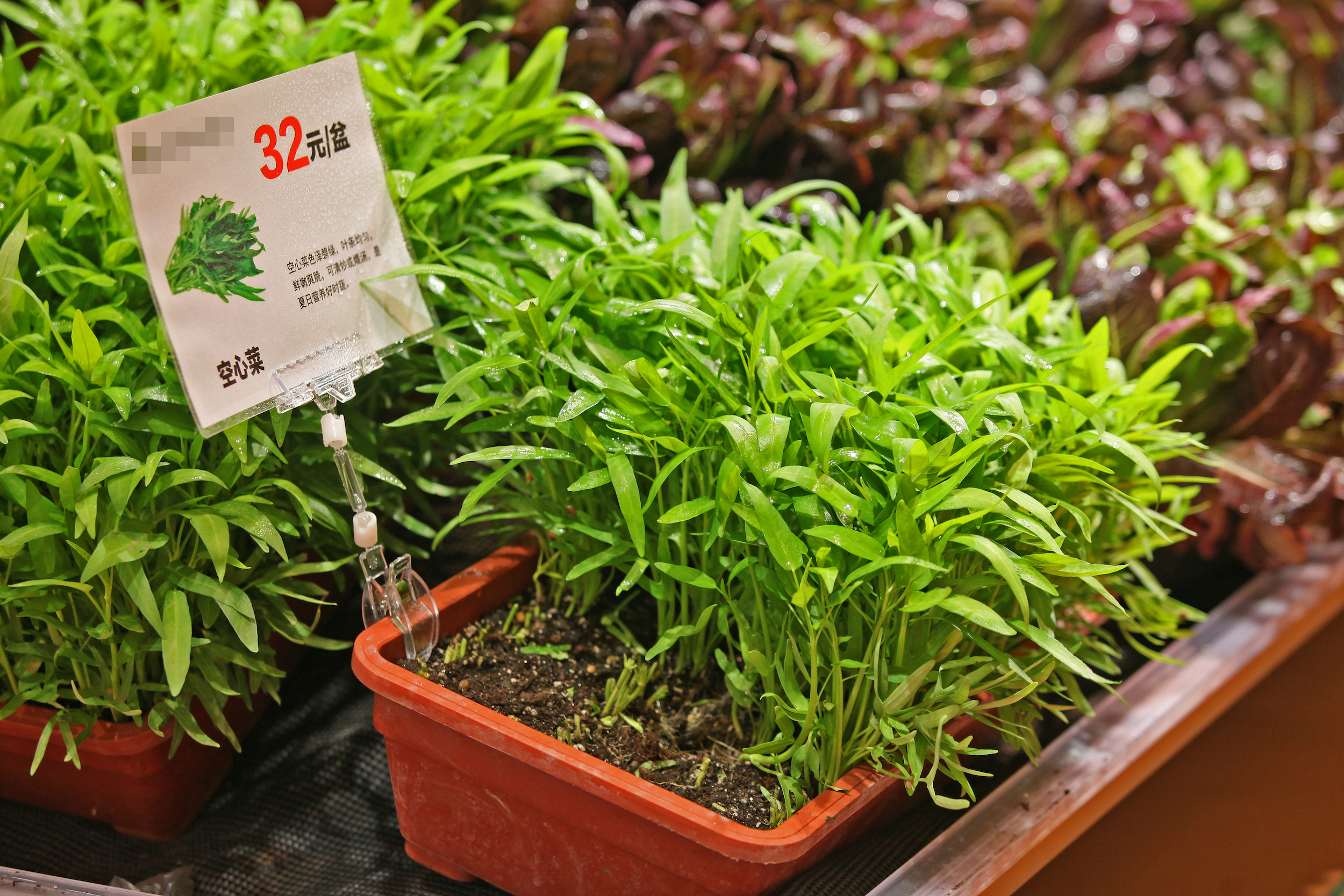
Image source: Visual China
Reporter | Ma Yue
Editor | Ya Han Xiang
The epidemic has moved the vegetable growing genes of urbanites, and they are studying vegetable growing in flowerpots on the balcony. But at the moment, “growing vegetables in pots” is not a small business, but a very large-scale industry. Recently, Fujing China Holdings Co., Ltd. (hereinafter referred to as “Fujing China”), the largest potted vegetable and agricultural product producer in Shandong Province, has submitted a prospectus to the Hong Kong Stock Exchange.
According to its prospectus, Fujing China is the largest producer of potted vegetable agricultural products in Shandong Province, which is the largest vegetable producing province in China in 2020, and its customers are mainly hotels and restaurants.
The company is one of the earliest potted vegetable producers in Shandong Province, and started mass production of potted vegetable agricultural products in 2016, with an annual output of over 1 million pots. Fujing China is principally engaged in the cultivation and sale of potted vegetable agricultural products, which are planted in pots and sold in pots. During the reporting period, its potted vegetable agricultural products included 27 varieties of leafy vegetables, such as chrysanthemum, rapeseed, chrysanthemum, lettuce, cabbage, lettuce, celery and tahini.
The main vegetable cultivation methods on the market today include open field vegetable cultivation, hydroponics, potted cultivation, etc. Open field vegetable cultivation refers to growing vegetables in the soil, which is the most common vegetable cultivation method in China. Hydroponics uses water-soluble nutrients to grow vegetables, while pot growing refers to growing vegetable produce in pots that contain a nutrient substrate.
Potted vegetable produce refers to vegetables grown in pots rather than on the ground. The main varieties of potted vegetables are leafy vegetables and nightshade vegetables, including spinach, lettuce, lettuce, leeks and tomatoes.


Source of potted vegetables: Visual China
Why plant vegetables in pots? When you grab a handful of “soil” from the vegetable pot, you will find that it is different from the soil in ordinary vegetable fields – it is a specially formulated organic substrate, mainly composed of cow dung, fungal residues, peanut shells The raw materials are processed by proportioning, mixing and high temperature fermentation. Compared to open-field vegetable produce, the use of this organic substrate allows potted vegetable produce to obtain ideal nutrition, grow healthily , and avoid the risk of contamination.
At the same time, potted vegetables also require the use of closed greenhouses along with the application of horticultural knowledge and equipment regarding pest control, insulation, ventilation (and perhaps shading) to create a suitable and ideal microclimate growing environment for potted vegetable produce. The entire cultivation process of Fujing China’s potted vegetable agricultural products from raw material procurement to product delivery takes about 40 to 50 days, depending on the type of vegetable agricultural products and the cultivation season.
Compared with traditional cultivation, cultivating potted vegetable agricultural products has many advantages such as lower cost, land saving, higher productivity, higher quality and inertia, but it also has higher requirements in terms of cultivation and management. In recent years, the cultivation of potted vegetables has also promoted the scale of related industries.
According to Frost & Sullivan’s report in Fujing China’s prospectus, the sales volume of potted vegetable agricultural products in China increased from 63 million pots in 2015 to 221 million pots in 2020, with a compound annual growth rate of approximately 28.5%. The total sales of potted vegetable agricultural products in China accounted for less than 0.1% of the total sales of vegetable agricultural products. In 2020, approximately 72.0% of potted vegetable agricultural products were sold through wholesale channels. Meanwhile, the sales revenue of potted vegetable agricultural products increased from RMB800 million in 2015 to RMB3.521 billion in 2020, representing a CAGR of approximately 34.5%.
Judging from the operating data disclosed by the company, Fujing China’s profits in 2019, 2020 and 2021 were 117.5 million yuan, 121.4 million yuan, and 154.9 million yuan respectively. In the same period, the gross profit was 59.247 million yuan, 55.577 million yuan and 68.947 million yuan respectively; the net profit was 44.328 million yuan, 47.837 million yuan and 54.929 million yuan respectively.
Fujing China has three planting bases for planting potted vegetables and agricultural products, including Laixi Base, Xi’an Base and Dalian Base, with a total area of about 434,300 square meters. There are 143 greenhouses in the company’s planting base, with a total construction area of 157,800 square meters.
From the perspective of the proportion of revenue to total revenue, the Lacey base is still the base with an absolute position, and its revenue ratio will be 90.5%, 87.1% and 91.2% in 2019, 2020 and 2021, respectively.

Fujing China Prospectus
Based on the location of the planting base, Fujing China’s main sales markets are Shandong Province, Xi’an City and Dalian City.
The company’s products are promoted and sold under the core brand “Fujiing Agriculture”, including 27 varieties of potted vegetable agricultural products. In accordance with industry practice, the company mainly sells the company’s potted vegetable agricultural products through its distributor network in China. The distributors then resell the company’s products to more than 1,000 customers in Shandong Province, Xi’an City and Dalian City, most of whom For hotels and restaurants.
The data shows that in 2019, 2020 and 2021, the company’s distributor sales accounted for 98.5%, 99.7% and 100% of the revenue for the same period, respectively. Taking it a step further, most of the company’s revenue comes from its five largest customers, and the company relies on the company’s main suppliers. In 2019, 2020 and 2021, the company’s revenue from the five largest distributors was 70.1%, 56.1% and 66.3%, respectively, and the revenue from the largest customer during the period was 18.7%, 15.3% and 16.3%, respectively.
Judging from the existing competition pattern, the entire potted vegetable agricultural product market is still highly fragmented.
There are about 1 to 2 million vegetable producers in the market in 2020. In terms of production volume, no single vegetable producer accounts for more than 1% of the total market share of China’s vegetable agricultural products market. In 2020, Fujing China’s sales revenue was RMB 121 million, accounting for less than 0.01% of the total sales revenue of vegetable producers in China. Meanwhile, the potted vegetable agricultural product market in China in 2020 is also highly fragmented, with thousands of potted vegetable producers. In 2020, Fujing China’s sales revenue of RMB 121 million accounted for approximately 3.4% of the total sales revenue of potted vegetable producers in China.
Although Fujing China is already the largest potted vegetable producer in Shandong Province in terms of sales revenue, there are more than 500 potted vegetable producers in Shandong in 2020.
At the same time, the company’s future market expansion direction is in Beijing and Langfang.
The prospectus shows that due to the relatively low penetration rate of potted vegetables and agricultural products in the Beijing and Langfang markets and ample room for future growth, coupled with the geographical proximity to their existing markets in Shandong Province and Dalian (both in North China), consumers’ diet Habits are similar. Given the low market penetration and similarity to its existing markets, the company believes that Beijing and Langfang are suitable markets for the expansion of potted vegetable agricultural products.
As a result, when Fujing China was preparing to establish a planting base in Langfang, it also began to identify and identify potential local distributors in Beijing and Langfang to establish a sales network. As at the Latest Practicable Date, the Company has entered into non-legally binding letters of intent with two potential distributors in Langfang and one potential distributor in Beijing to distribute its potted vegetable agricultural products after the new planting base is commissioned. According to the Letter of Intent, the distributors indicated their intention to purchase a total of 950,000 pots of potted vegetable agricultural products in 2023.
media coverage
Titanium Media Interface Mustard Pile
Related events
- Fujing China, a potted vegetable and agricultural product producer, hits Hong Kong stock IPO three times 2022-04-18
- Pinduoduo ‘s “Indonesia National Pavilion” was launched, and the order volume in the live broadcast room increased by nearly 280% year-on-year 2020-10-18
- Gansu Provincial Department of Commerce and Pinduoduo reached a strategic cooperation: launch “Gansu Youpin Pavilion” 2020-09-29
- Pinduoduo announces the launch of “Jiangxi Harvest Hall” 2020-09-23
- Pinduoduo invested 1 billion to launch the “National Brand Pavilion” plan2020-07-28
This article is reprinted from: https://readhub.cn/topic/8fjshy4YHy8
This site is for inclusion only, and the copyright belongs to the original author.